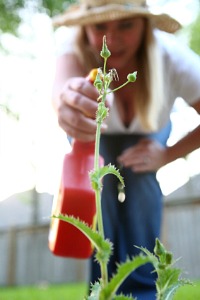The best organic weed control method will always be a vigorous, well-managed lawn. A weed seed will germinate when it finds moisture, sunlight and a good place to grow. Once a seed sprouts, it relies on food stores until it grows tall enough for its leaves to reach sunlight and make food through photosynthesis. A thick, dense, vigorous lawn will choke out any weed seedlings attempting to invade.
Weeds are by far the most problematic lawn pests. A weed is any undesirable plant growing where it is not wanted. Natural lawns sometimes require us to reconsider what we define as a weed. For example, clover is commonly considered a lawn weed. However, clover is a legume that has the ability to fixate (absorb) nitrogen from the atmosphere adding it to the soil. It also tolerates close mowing and traffic – clover makes a good companion plant for lawn grasses and you would consider leaving clover in a chemical-free lawn.
The best chemical-free method to use on the few weeds you find in your dense, vigorous lawn is to physically remove them. Pull them or use a weeding tool to remove them before they go to seed and spread. Regular monitoring and hand weeding are the ultimate organic weed control.
Natural Organic Weed Killers – Non Selective, Post Emergent
All of the natural herbicides available for use in lawns and gardens are non-selective – they work on grass and broadleaf weeds.
Available options include:
- Herbicidal Soaps
- Citrus oil-based herbicides
- Vinegar (acetic acid)
Herbicidal soaps are similar to dish soaps but are highly refined. They penetrate and break down the waxy protective coating of plant leaves, causing the leaves to dehydrate and die. Citrus oil-based herbicides work in the same way.
Herbicidal soaps are a contact pesticide, very effective at killing plant parts they come into contact with but will not kill weed roots. They work best on young weeds, annuals and biennials in the first year of their life cycle. Common chickweed, plantain, crabgrass and oxalis are examples of lawn weeds that can be controlled with soaps.

Soaps are non-selective. They will damage any plant they come into contact with. Care must be taken to avoid damage to non-target plants.
Vinegar (acetic acid) based products work the same as soaps and oils – causing dehydration and death of plant parts they contact. And just like herbicidal soaps, they are only effective against annual weeds.
Kitchen-grade vinegar is not an effective herbicide, its acetic acid concentration is only 5%. The acetic acid concentration needs to be at least 20% to be an effective natural organic weed control.
Caution! If you choose to use a vinegar-based product, read and follow all label directions. Just because it is a natural weed killer, does not mean it is totally safe.
For Example: Weed Pharm is an EPA-registered herbicide. The label signal word is DANGER. This is because acetic acid at 20% concentration can cause permanent eye damage and skin burns.
Pre-Emergent Organic Weed Control
Corn Gluten Meal (CGM) has shown to be an effective natural organic weed killer. However, it is finicky when it comes to environmental conditions – they have to be just right. It seems to work best in Northern climates and Kentucky bluegrass lawns.
CGM is used as a preemergent to control crabgrass and other annual lawn weeds. It basically destroys the developing roots of seedlings causing death. CGM will not work on established weeds.
Corn gluten meal should be applied in early spring just after the last frost. It also contains 10% nitrogen by weight so it can be substituted for an early spring fertilizer.
New Product for the Lawn Pros!
Fiesta® is an iron-based lawn weed killer that is safe and eco-friendly. It will kill or suppress common broadleaf lawn weeds and moss, liverworts, algae, and lichens. Fiesta® is perfect for mixing in a backpack sprayer and spot-spraying weeds.
It’s my opinion that Fiesta® works well on annual weeds and only suppresses perennial weeds. It is only a contact herbicide and will not kill the roots.
The best strategy for using this product on tough perennials – like dandelions – is timing and then repeat applications. The best time to kill dandelions is late spring and fall – right after they finish flowering. They use up a lot of stored energy and are weakened after flowering. They need foliage to rebuild carbohydrate reserves stored in their roots. Each application will defoliate and further weaken the weed. Hopefully, kill it…
According to the Fiesta® label, you can make up to 4 applications per year in the same spot, and repeat applications can be made after 3 to 4 weeks.
CGM is preemergent to control crabgrass and other annual lawn weeds. It destroys the developing roots of seedlings, causing death. CGM will not work on established weeds.
Corn gluten meal should be applied in early spring, just after the last frost. It also contains 10% nitrogen by weight, so it can be substituted for an early spring fertilizer.
You might like these
Organic Lawn Fertilizer | Benefits of Natural Fertilizers
Organic Lawn Fertilizer: Benefits of natural fertilizers. How natural products improve the soil and health of landscapes. Helpful DIY lawn care tips.
Chemical Fertilizers vs. Organic lawn Fertilizer
Are natural organic fertilizers safer than chemical fertilizers? Are they better or safer for lawns, the environment, and your family? Do synthetic sources of nutrients harm the soil?
Vinegar Weed Killer vs Roundup
Why your recipe for homemade vinegar weed killer won’t work. Glyphosate is a more effective and safe non-selective herbicide. Helpful DIY lawn care tips and advice. Organic weed control and more.
